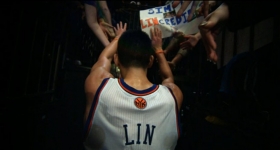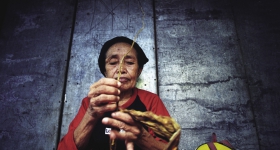Deconstructing the foods and flavors of childhood have played a prominent role in trying to figure out what it means to, as Christine H. Lee posits in the first piece in this series, “How to Play with Your Food Like an Asian American.” Some of us willingly forget the days of “stinky” lunches or having to explain the smells from our moms’ kimchi refrigerator in our garage. Or, perhaps as Asian American adoptees, we were introduced to the flavors of our birth country only as adults and struggle to figure out what they mean to us now. We struggle to articulate our relationships to these aspects of food and family when they weren’t naturally knitted into the landscape of the foods we witnessed in the everyday imaginings of our America. Despite our often complicated relationships to these flavors and ingredients, however, we continue to find them in our refrigerators, on our dinner table, in the takeout we hybridize (kimchi on Domino’s pizza, anyone?) and in the restaurants that we visit. Deconstructing our palates might never actually result in the production of this America, but that is always inherently a part of our Asian America.
The endless connections of food and family are maybe most intimately told in cookbooks, giving readers an insight into the mind and memory of creating dishes. Hyphen’s DECONSTRUCTING COOKBOOKS series merges the Books and Food sections to bring you exciting reviews and response pieces to Asian American cookbooks. The rise of second generation Asian Americans recreating foods of their family’s homes has resulted in a vast array of books, podcasts and media resounding these relationships between cooking, family, history and culture. The books featured in our series deconstruct the moments where foods and flavors are not only about the ingredients that culminate in creating one dish — but also about the histories, personal reflections and relationships that belie their creation. Through these stories, the reader is again thrown into what feels like a hodgepodge of ingredients that are both familiar and unfamiliar to make dishes that belong neither to their parents’ home country nor fully in their home country.
Breaking down the recipes and ingredients that go into the foods that we, the readers, quite literally consume in our kitchens are always part of the chef and writer’s story. As the Li siblings, Margaret (who often goes by Mei), Irene and Andrew, discuss in Christine Lee’s review of Double Awesome Chinese Food (2019), their recipes might not be what you think of as traditional Chinese food because it’s influenced by Chinese food in the New England context that they were raised. Coral Lee turns to memories of Martin Yan’s PBS TV show and his cookbook, The Yan Can Cook Book (1982) to piece together the image of an Asian American chef on TV in the 1980s that lent itself to a tokenization of Asians in America — as well as the complicated ways in which his recipes caused her to reflect on the culinary traditions handed down through her family. Rachel Gray reviews Sarah Gambito’s Loves You (2019), which takes the format of poetry and recipes to tell the story of Filipino-American food through themes of parenting, identity and language. Later on in the series, we’ll hear from Mimi Khúc about cooking and mental health, Noah Cho, whose column, Bad Kimchi, over at Catapult already tackles his relationship with food, and Kim Sunée, the author of Everyday Korean: Fresh, Modern Recipes for Home Cooks.
This series centers on cookbooks as a form that can offer the reader more than just the presentation of recipes. These books represent the complex and bountiful stories of the Asian American dinner table to unpack the memories and emotions surrounding the daily act of cooking in the everyday kitchen.
Check out our Instagram Contest here and enter to win a copy of Sarah Gambito's Loves You. Share a picture of a dish that has been essential to understanding your Asian American identity. Contest ends August 31, 2019.
— Sarah Huang, Food Editor & Leah Silvieus, Books Editor
Follow along with the series:
- How to Play with Your Food like An Asian American by Christine H. Lee
- Oriental Picnic by Coral Lee
- "And yet, we meet there": On Resistance, Memory, and Transformation in Sarah Gambito's Loves You by Rachel Ronquillo Gray
- This Love and Its Labors by Mimi Khúc, PhD
- You'll Never Guess How to Make the Best Egg Ever! by Elaine Wang
- This Cookbook is Really a Love Letter: on Priya Krishna's Indian-ish by Rachel Ronquillo Gray
- Cambodian Cuisine and The Elephant Walk Cookbook by Suphada Rom










Comments